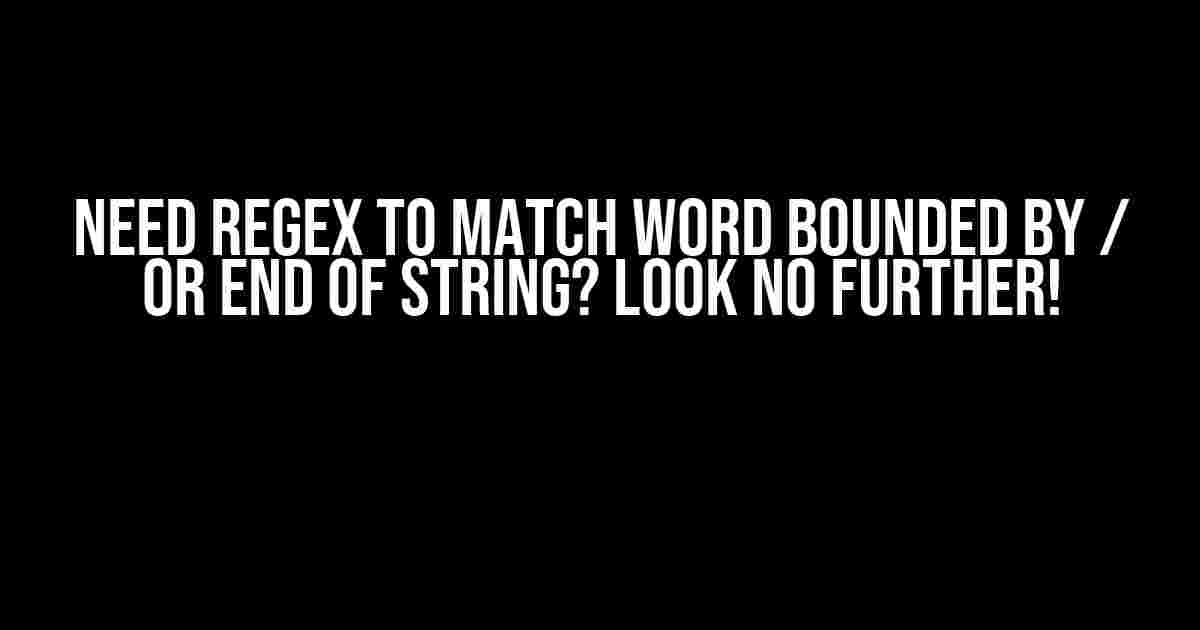Introduction
Regex, the unsung hero of text manipulation! When it comes to matching patterns, regex is the way to go. But, what happens when you need to match a word bounded by a specific character, like a forward slash (/), or the end of a string? Fear not, dear reader, for today we’ll embark on a thrilling adventure to conquer this very challenge.
Understanding the Problem
Imagine you have a string that contains a series of words, separated by forward slashes (/). You need to extract a specific word, but only when it’s bounded by a forward slash or the end of the string. Sounds simple, right? Well, it’s not as straightforward as it seems. That’s where regex comes in to save the day!
Example Scenarios
Let’s consider a few examples to illustrate the problem:
- Input string: “hello/world/regex/match”
Match: “regex” (bounded by “/match” and the end of the string) - Input string: “foo/bar/baz/qux”
No match (since “qux” isn’t bounded by a “/”) - Input string: “regex/string/end”
Match: “end” (bounded by the end of the string)
Regex to the Rescue!
After analyzing the problem, we can create a regex pattern that matches our requirements. Drumroll, please…
\b(?:/(?!/|$)|$)\bDon’t worry if it looks like a bunch of gibberish; we’ll break it down together.
Regex Pattern Explained
Let’s dissect the pattern:
| Part | Explanation |
|---|---|
| \b | Word boundary (ensures we match a whole word) |
| (?: | Non-capturing group (we don’t need to capture anything) |
| /(?!/|$) | Forward slash (/) not followed by another forward slash or the end of the string (?!/|$ is a negative lookahead) |
| | | Alternation (OR) operator |
| $ | End of the string |
| ) | Closes the non-capturing group |
| \b | Word boundary (again, to ensure we match a whole word) |
Putting it into Practice
Now that we have our regex pattern, let’s see it in action:
const regex = /\b(?:\/(?!\/|$)|$)\b/g;
const inputString = "hello/world/regex/match";
const matches = inputString.match(regex);
console.log(matches); // Output: ["regex", "match"]In this example, we’re using the g flag to enable global matching, so we get all matches in the string.
Conclusion
And there you have it! With this regex pattern, you can match words bounded by a forward slash (/) or the end of a string. Remember, the key is to use a combination of word boundaries, non-capturing groups, and negative lookaheads to ensure we match the desired words.
Final Tips and Variations
Here are a few more tips and variations to keep in mind:
- Use the
iflag for case-insensitive matching. - Replace the forward slash (/) with any other character you need to match.
- Adjust the word boundaries (\b) if you need to match parts of words.
- Use regex flavors like PCRE or .NET if you need more advanced features.
// Case-insensitive matching
const regex = /\b(?:\/(?!\/|$)|$)\b/gi;
// Matching a different character
const regex = /\b(?:\|(?!\/|$)|$)\b/g;
// Matching parts of words
const regex = /\b(?:\/(?!\/|$)|$)\w*\b/g;Now, go forth and conquer the world of regex! With this pattern, you’ll be able to match words bounded by a forward slash (/) or the end of a string like a pro.
Last but not least, remember to always test and refine your regex patterns to ensure they work correctly for your specific use cases.
Here are 5 Questions and Answers about “Need regex to match word bounded by / or end of string”:
Frequently Asked Questions
Regex can be a bit tricky, but don’t worry, we’ve got you covered!
How can I match a word that is bounded by a forward slash (/) or the end of a string using regex?
You can use the following regex pattern: `(?<=/|^)word(?=/|$)`, where `word` is the word you want to match. The `(?<=/|^)` is a positive lookbehind that ensures the word is prefixed by either a `/` or the start of the string, and the `(?=/|$)` is a positive lookahead that ensures the word is suffixed by either a `/` or the end of the string.
What if I want to match a word that is bounded by a / or the end of a string, but also allow for optional whitespace characters around the word?
You can use the following regex pattern: `(?<=/|^)\s*word\s*(?=/|$)`. The `\s*` matches zero or more whitespace characters, allowing for optional whitespace around the word.
How can I make the word matching case-insensitive?
You can add the `(?i)` modifier at the start of the regex pattern to make it case-insensitive. For example: `(?i)(?<=/|^)word(?=/|$)`. This will match the word regardless of whether it's in uppercase, lowercase, or a mix of both.
What if I want to match multiple words bounded by / or the end of a string?
You can use the following regex pattern: `(?<=/|^)(word1|word2|word3)(?=/|$)`, where `word1`, `word2`, and `word3` are the words you want to match. The `|` character is a logical OR operator that allows you to match any of the specified words.
Can I use regex to match word boundaries without using lookaround assertions?
Yes, you can use the `\b` word boundary assertion to match word boundaries without using lookaround assertions. For example: `/(?:/|^)\bword\b(?:/|$)/`. Note that this approach may not be as flexible as using lookaround assertions, but it can be a viable alternative in some cases.
